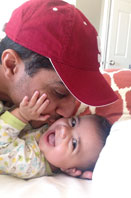Interview with Niraj Sehgal, MD, MPH
A Conversation with Niraj Sehgal, Professor
Niraj, I am admittedly intimidated at the idea of interviewing a superstar. If you lived the life of a superstar, what might your dream home look like?
 My dream home in many ways would reflect both stage of life and things that are important to me. I would like a space stylistically that is fairly contemporary, but also inviting; a place that would welcome friends, family, and community. As a crazy feature, I would want a massive man-cave sports bar with big screen television sets, something that makes the experience of watching sports even more fun.
My dream home in many ways would reflect both stage of life and things that are important to me. I would like a space stylistically that is fairly contemporary, but also inviting; a place that would welcome friends, family, and community. As a crazy feature, I would want a massive man-cave sports bar with big screen television sets, something that makes the experience of watching sports even more fun.
Would you tell me about your parents and family?
My entire family migrated from Chicago to Southern California in recent years. I have a younger brother who lives in Los Angeles and while we share many values and interests, we lead very different lives. He’s an incredibly bright and energetic entrepreneur who among other accomplishments co-owns a restaurant in Hollywood (Wood & Vine) and helped produce a documentary that has done well (Craigslist Joe). My parents came to Chicago in their early 20s, leaving their small village in India for higher education and the many opportunities that the US offered to their generation. Most of my value system definitely came in large part from who they are and the decisions they made. For example, I laugh at how much nervous energy I had about leaving Chicago for the West coast. Comparing that to what my parents did in leaving an entire continent and coming to a new place is hard to imagine doing. Both of my parents were in science and involved in clinical research, and they worked closely together for almost three decades. They are role models for many of my values: gratitude for opportunities, resiliency, a strong sense of family and community, and humility, in terms of realizing that sometimes the success you have has little to do with you.
If Jon Stewart and Stephen Colbert were to run in the 2016 presidential race, would you chuck it all to be their campaign manager?
Yes, I would be their campaign manager in a heartbeat but not because I could do the job well. It would be amazingly fun to work with both of them. Stewart and Colbert have political views that resonate and I vastly appreciate the humor and levity that they bring to the news with lots of reality embedded in that levity. What I admire about them is not just about The Daily Show or the Colbert Report, but their work is a function of who they are and what they believe. It’s easy to respect the impact and influence they have had, particularly in their ability to leverage a great sense of humor in doing so.
As a youngster, what sports did you play?
I was probably a pretty stereotypical boy growing up in the Midwest and didn’t have a lot of activities other than playing sports every day after school. I played both soccer and tennis in school, but tennis was about 95% of my energy and time, which included playing competitively regionally and nationally. A pivot point for me was when I was applying to college and had opportunities for tennis scholarships at Division I schools that were not great academically. I made the very good decision to play Division III and enjoy a much better academic experience. Tennis is still a big part of who I am and it’s funny how much I learned about myself and life by playing tennis; discipline, resilience, and dedication as well as the physical, emotional, and mental aspects of taking care of myself. Tennis was also a big part of my family; both of my parents were tennis players and as soon as I could stand, I had a tennis racket in my hand. It is my New Year’s resolution every year to make it a part of what I do again but so far, it’s a goal that I haven’t achieved. Here’s looking at 2015…
This question is courtesy of Dr. Auerbach: How do you keep your boyish good looks even as the Cubs go more than a century without a World Series win?
He’s the researcher so I’ll let him connect the cause–effect dots but the Yankees have won lots of championships. The Cubs have not. He has no hair and I have a full head of hair. Which team would you recommend rooting for to maintain boyish looks? Tell him to incubate on that. Growing up a Cubs fan is certainly a lesson in patience, unconditional love, and optimism. My friends and family will tell you that they rarely see me being expressively angry except when a Chicago sports event goes wrong. Sadly, it happens more than I’d like.
In your many and diverse roles, do you feel yourself to be a coach, a ref, or a team member?
Part of what I love about my work is that I get to be all three at different times, depending on the situation. The coaching part is fun because it’s really about allowing people to fulfill their potential. The people I’ve been most influenced by, those that I would call great leaders, do it all: sometimes they are coaches, sometimes they are referees, and sometimes they are team members. They know when to lead and know when to follow. More importantly, they want people and teams to fill their potential. Part of success is an ability to play all of those roles. I’m definitely still on the learning curve.
What images do these old-fashioned, little-used words conjure for you? Loyalty. Honor. Pride.
Loyalty resonates as a core value of mine, one that I consider a strength that can also become a fault. It’s such an important part of relationships and trust that it’s an obvious positive, but it can also allow you to get into trouble if misplaced. Honor is interesting because it sounds traditional in that you don’t hear people use it these days. It conjures images from a movie like A Few Good Men though I’ve never called or been the recipient of a Code Red myself. Pride is a feeling that everyone should have for something. When it’s not readily obvious what that is for someone, you hope others can help them discover it; not by asking what they do or how they do it but by focusing on why they do it.
What is creativity, both within the workplace and in your personal life?
Creating space, opportunity, and dialogue with people fosters creativity. Sitting by yourself to develop a new idea, whether in the personal or professional context, probably works for people who are inherently creative but it doesn’t for me. In order for me to get to a space of being creative, it’s about having conversations or experiences with people of different backgrounds and learning to ask more questions than provide answers. It’s partly why I love international travel. It opens your mind to so many different facets of life and yourself.
What are the most important things to know in the first year of fatherhood? What was the best advice another man gave to you before your daughter was born?
 Having the opportunity to start a family in your 40s is quite different than in your 20s or 30s. I feel unbelievably grateful to have watched and benefited from all of my friends become amazing parents while also seeing the flip side of the strain on life that children can bring. Having seen the full spectrum probably prepared me for knowing that there’s a lot you can’t control, but at least for the things you can control, I do appreciate every moment for what it is. One of my favorite pieces of parenting wisdom, from Steve Pantilat, is his life cycle of parenthood: “you begin as a Sherpa and carry stuff around, then turn into a chauffeur to drive them around, and then you become an ATM.” Nothing can really prepare you for how you feel about your child, how it felt to bring them home, or what it would be like for the first several months. Every day is really different but incredibly fun and energizing.
Having the opportunity to start a family in your 40s is quite different than in your 20s or 30s. I feel unbelievably grateful to have watched and benefited from all of my friends become amazing parents while also seeing the flip side of the strain on life that children can bring. Having seen the full spectrum probably prepared me for knowing that there’s a lot you can’t control, but at least for the things you can control, I do appreciate every moment for what it is. One of my favorite pieces of parenting wisdom, from Steve Pantilat, is his life cycle of parenthood: “you begin as a Sherpa and carry stuff around, then turn into a chauffeur to drive them around, and then you become an ATM.” Nothing can really prepare you for how you feel about your child, how it felt to bring them home, or what it would be like for the first several months. Every day is really different but incredibly fun and energizing.
Niraj, thank you for sharing.
- by Oralia Schatzman
View Niraj's professional bio | See previous faculty interviews
